Each year on March 31, the world observes Transgender Day of Visibility (TDOV) to celebrate the lives and contributions of trans people, while also drawing attention to the disproportionate levels of poverty, discrimination, and violence the community faces compared to cisgender (non-transgender) people.
International TDOV was created in 2010 by trans advocate Rachel Crandall. Crandall, the head of Transgender Michigan, created TDOV in response to the overwhelming majority of media stories about transgender people being focused on violence. She hoped to create a day where people could celebrate the lives of transgender people, while simultaneously acknowledging that due to discrimination, not every trans person can or wants to be visible.
For many transgender people, it feels as if we are living in unprecedented times. In just the first three months of 2025, a staggering 821 anti-trans bills have been introduced in state legislatures across the country. Furthermore, the current administration has targeted trans people through executive orders limiting trans people’s ability to obtain passports that accurately reflect our gender, attempted to reinstate a blanket ban on trans people serving in the military, and a number of other orders of varying enforceability aimed at erasing trans people from public life.
Part of the fear-mongering around trans people is predicated on the idea that being a trans person is a new fad or phase, when the reality is that trans people have existed as long as people have existed. So for this Trans Day of Visibility, we are spotlighting six incredible trans community elders, sharing their messages of resilience for these difficult times, and offer words of hope.
Sharing their thoughts with us are acclaimed actress and singer, Sandra Caldwell; citizen of the Oneida Nation and Anishinaabe Tribe, and Indigiqueer/two-spirit Nation, Grammy-winning musician and storyteller, Ty Defoe; President and CEO of the Trans Latin@ Coalition, Bamby Salcedo; Executive Director of Advocates For Trans Equality (A4TE), Rodrigo Heng-Lehtinen; celebrated academic theorist, researcher, and founder of the Advanced Communication Technology Laboratory, Allucquére Rosanne “Sandy” Stone; and Houstonian and Executive Director of Transgender Education Network of Texas, Emmett Schelling. (Full bios can be found at the bottom of the article)
(Please note, interview responses have been lightly edited for clarity and length)
“I have found
music to release
dancing to sweat
relatives in community
and delicious food
to nourish my soul.
In these practices,
I am alive and resilient.”
– Ty Defoe
Resilience and community, both past and present, were the major themes of our conversations with these trans people who transitioned many years ago. One common theme running through their answers was that community didn’t exist back in the mid-20th century in the way it does today.
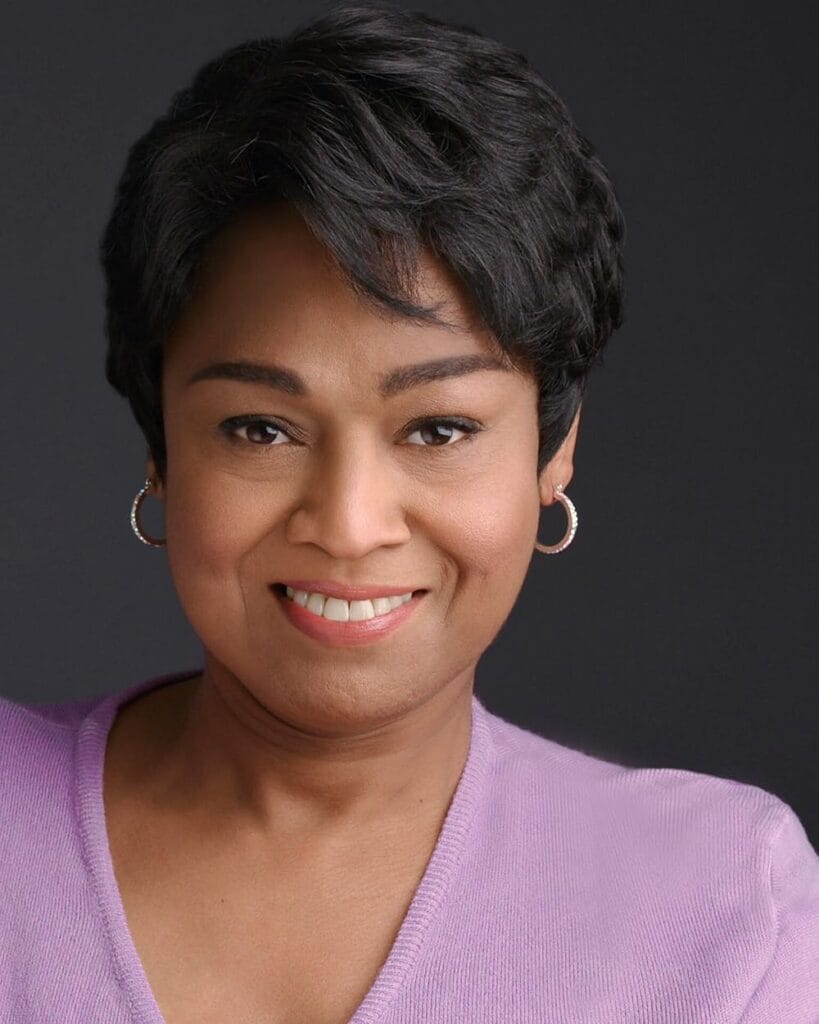
Sandra Caldwell, who transitioned in the 1970s, said, “We weren’t allowed so much to be in community. I have to be honest about this, because I wasn’t in community. Community was separated back then… the Black queer community, the Black gay community, Black trans community, hadn’t found themselves yet. So we joined in with other communities and learned, learned from what we could get.” She continued, “The key words were, keep your head down, keep your mouth shut, and keep it moving… that kept you alive… I was stealth for a good 35 to 40 years… That allowed me to work, that allowed me to get an [acting] career going, that allowed me everything… but I was always nervous waiting for the other shoe to drop… It was the silliest thing to think about… I was worried about [getting fired due to] silly things like morals clauses in show-biz contracts, not was I doing a good job.”
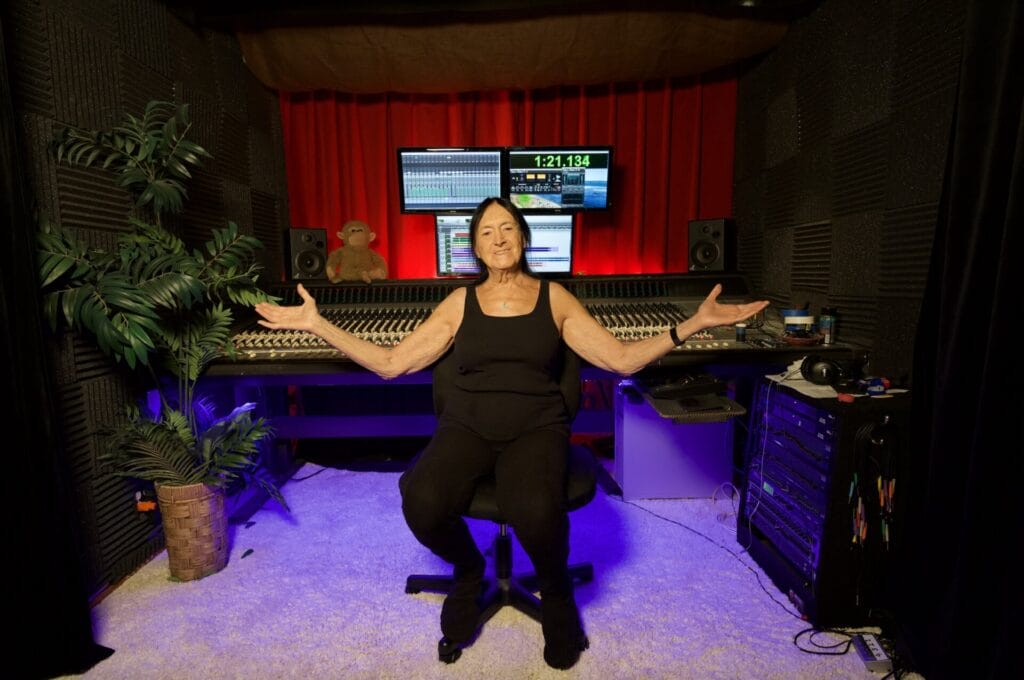
Sandy Stone, who transitioned in the 1960s, echoed these sentiments, stating, “I didn’t have the luxury of trans support networks during transition. Consequently, I had no reference for the accompanying physical, emotional, and chemical turmoil.”
She went on to explain a brief flash of community that she did experience early on, which changed everything. “During the worst of it, when I was fried, exhausted, and desperate, I encountered a trans woman who took one look at me and invited me to her home, where she offered me a meal and asked me to listen to some recorded music. It was Cris Williamson’s ‘Changer and the Changed’, and it changed my life. It was a gateway to a community, not physically present but real in both immediate and potential ways. It taught me that even being able to say, ‘They’re out there,’ can sustain you for a long time.”
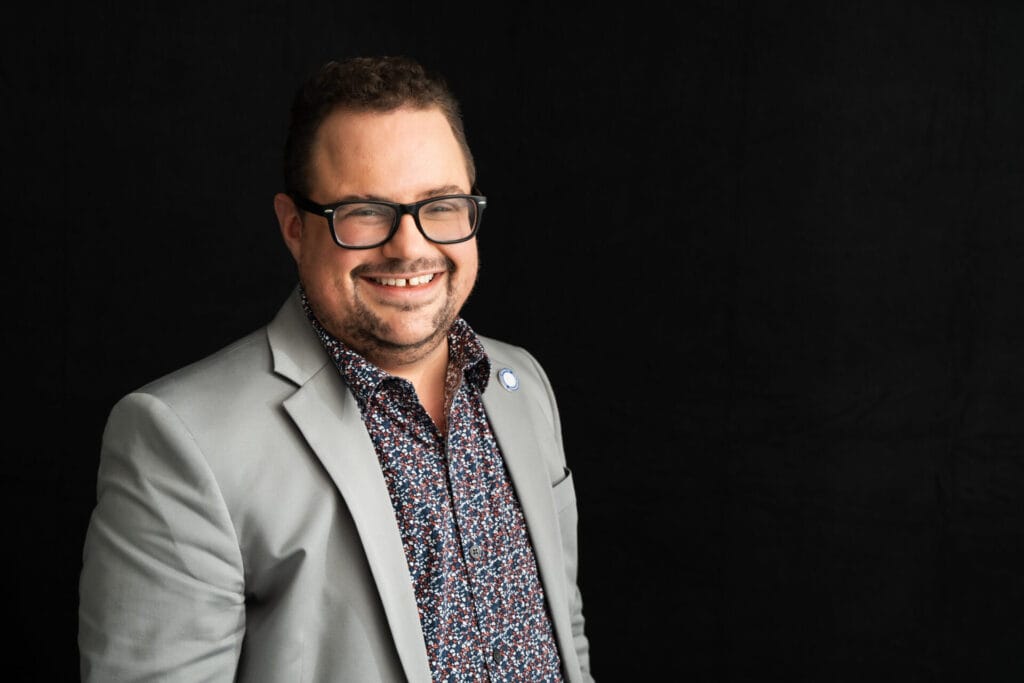
Where we come from and where we’ve gotten to now is something many of our interviewees took a lot of strength from. Rodrigo Heng-Lehtinen stated, “I draw a lot of inspiration from history. Right now, it’s easy to get disheartened because we’re being targeted and attacked by those in power. It’s the backlash to all the progress we made these last 20 years. But we’ve been here before. The history of the LGBTQ movement, and really all social justice movements in the US, is cycles of progress and backlash and progress again. It’s cyclical. That doesn’t make it easy, it still hurts. But hurting is not the same as giving up. We’ve made it through before. We will make it through again. That’s not naiveté, it’s history.”
The contrast between where we were 60 years ago to now became a main area of discussion; especially the ways in which community is a source of strength for us that we may not have had in the past to weather hostile storms.
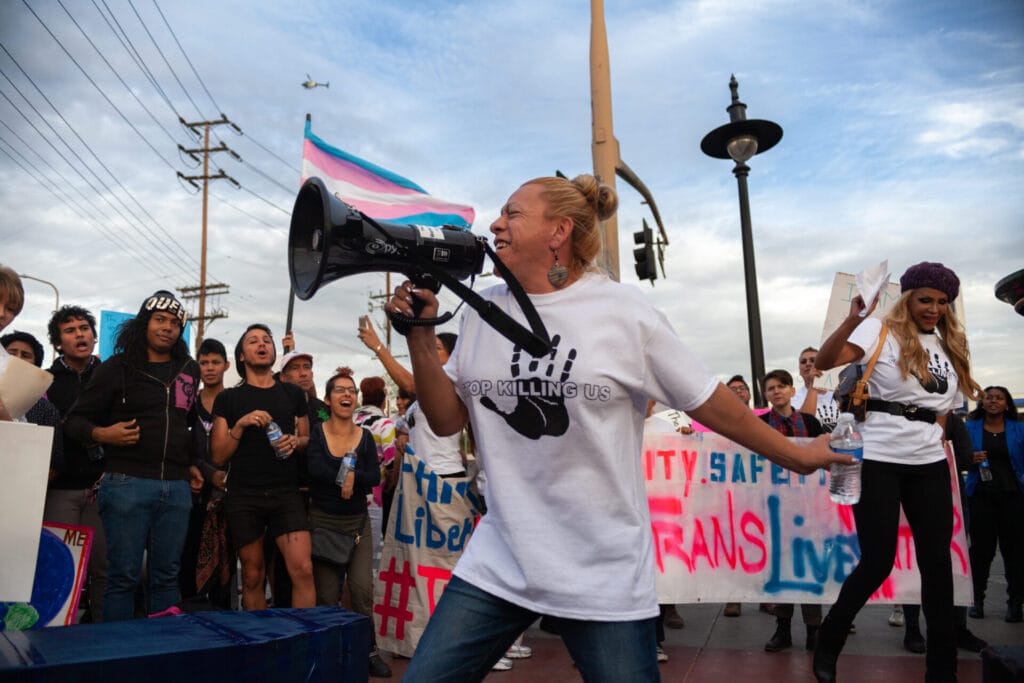
In speaking about her own experiences, Bamby Salcedo added, “When I first, you know, got out of rehab, and I was early [in my transition] and entering into social justice work, I remember members of our community, particularly trans women who were leaders and skilled leaders at that time… they would tell me affirming words… Like you are a strong person, you’re going to do great things, and you are a leader in our community.” She went on, “I obviously didn’t understand at the time… but just hearing those words of encouragement and really thinking that I was someone was definitely uplifting. [It] supported me to eventually believe that I could do great things. And now I have been a manifestation of that.”
“I have the privilege to be the president and the CEO of the Trans Latin@ Coalition. And my definition of a CEO is ‘Community Elevated Officer’, because I believe that it has been the community who has uplifted me and supported me to be the person that I am today… And so to me, community is integral to my work and into my existence.”
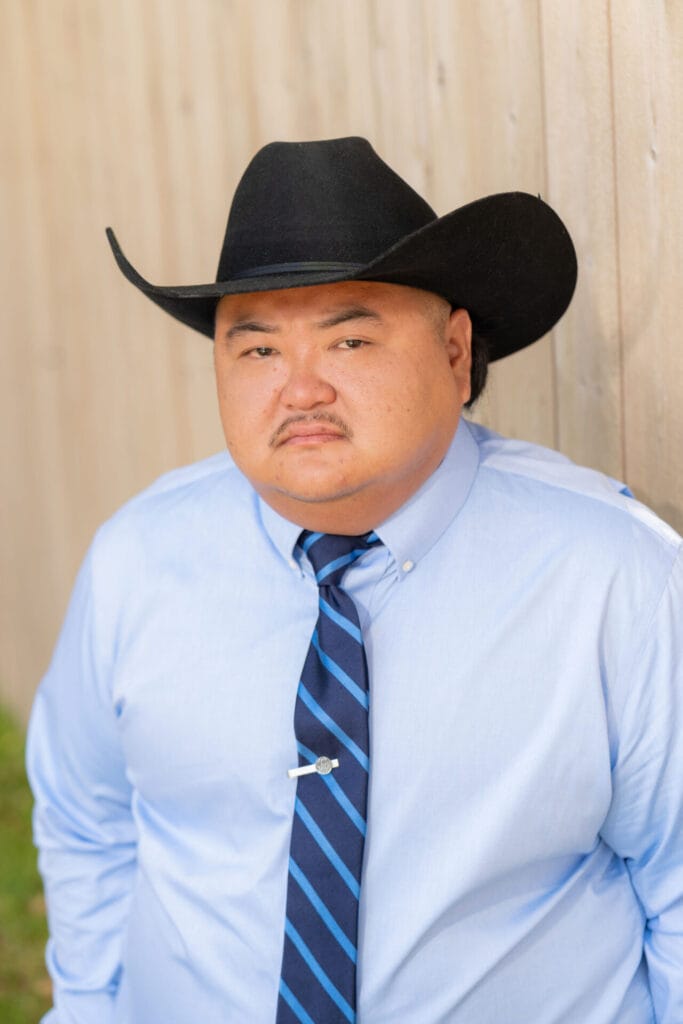
The importance of community uplift was echoed by Emmett Schelling, “I’ve had to go through a lot as a trans man, single parent, immigrant, and Texan. In spite of all the systemic barriers and people that told me I wasn’t worthy, I have built the life every trans person deserves. I am living the life I wanted for myself as a husband, a father, and a Houstonian. I could have never done this without the support, friendship, and camaraderie I found in the trans Texan community, the community at large, and through the friends and chosen family I’ve made across the movement. When times are tough, we know we can lean on each other.”
He went on to discuss how the community is showing up for trans Texans today, saying “We’ve seen an uptick in trans-specific attacks coming from state leadership in Texas. This fight has been tough, and is exhausting at times for trans Texans. We’ve seen an outpouring of support from allies in Texas, and across the world… We’ve seen practical support from our friends across state lines and an outpouring of support from people across the globe through our Love Letters to Trans Texans campaign.”
And as Sandra pointed out, community isn’t a one way street in which elders give without getting in return, explaining, “I really couldn’t believe [the trans tipping point moment] when it first happened. I could not believe what was going on, because I never thought it would happen that our young trans women, our young queer gay folk, would go in this deep. I watched everyone. I took a little bit from everybody. I really did. A couple of my new, new dear friends, held my hand and pulled me along. I call them the kids.”
But that resilience doesn’t only come from community, it also comes from within. When Sandy talked about how she finds that resilience inside herself, she said, “By remembering times I watched some brave, forthright person beat the odds. Or by remembering times when I beat the odds. There’s nothing quite as satisfying as saying ‘I’m still here.’”
Sandra also spoke of building on the strength of not only trans people, but also the Black community, saying, “As a Black woman, I live by the rules of my family, my mom, my sisters, there’s a way of living as a Black woman that is like no other. You can’t reproduce it. It is what it is, the language is what it is, the lessons are what they are at being a Black woman, and that’s where I live. And I live from my humanness, from my family… That’s the lessons I bring to the community, to our community… I bring information from six decades of black women… six decades of black queer folk. I bring that information.”
When musing on the word “resilience”, Bamby added, “Well, I mean, it was completely honest for me, like I didn’t even know that word existed, right? … The fact that I have been able to overcome many different and horrific experiences right throughout my life… violence in many different forms… It has been my resilience that has allowed me to survive… But also I have had the opportunity to turn those horrific experiences into opportunities, not just for me, but also for members of my community.”
And she tied it all back, saying, “I would say, part of my resilience is also being able to pay it forward, right? Because, again, if we think of this full circle moment… I was supported by other trans people. And now I’m able to do work in community, for my community.
But this moment isn’t just about self-reliance, resilience, or trying to foster community. It’s also about trying to foster hope in an increasingly hostile environment.
When speaking about keeping the flame of hope alive, Sandy said, “There are two rules to this game: 1) Nothing is as bad as it looks. 2) Nothing is as good as it looks. Each time you figure out how to deal with an obstacle, each time you encounter a challenge and come out the other side, possibly bruised and abused but still alive, you become a little smarter and a little stronger… This is going to be a rough time, but we’ll surmount it the same way we surmounted the horrors of the recent past. We learned. We changed the terms of engagement. And we’re still here…and we’re tougher. Sometimes, when everything looks hopeless, when all we have is just the instinct to show up…then just show up. Just show up. Trust that. After a while, in spite of weariness or numbness or despair, the next step appears, and then the next. And then you begin to truly understand who you are and what your gift is and why you’re here.”
And when thinking about the concept of hope, Bamby reminded us that hope isn’t only an emotion, it can also be an action, saying, “Many members of our community do live in hope, right? Because hope is what, in my opinion, carries me to a better place… Understand that again, there are many members of our community who are doing amazing work, who are organizing, are strategizing, are mobilizing people to understand that we can create a better world and we can create a better future for us, and that’s certainly what we as an organization are doing… And you know, the Trans Latin@ Coalition is an organization that will continue to foster leaders, and we’ll have resources to continue to support our community… despite the oppression that we continue to experience, so there will be a better future for all of us. It’s just a matter of us making sure that we work together to create that.”
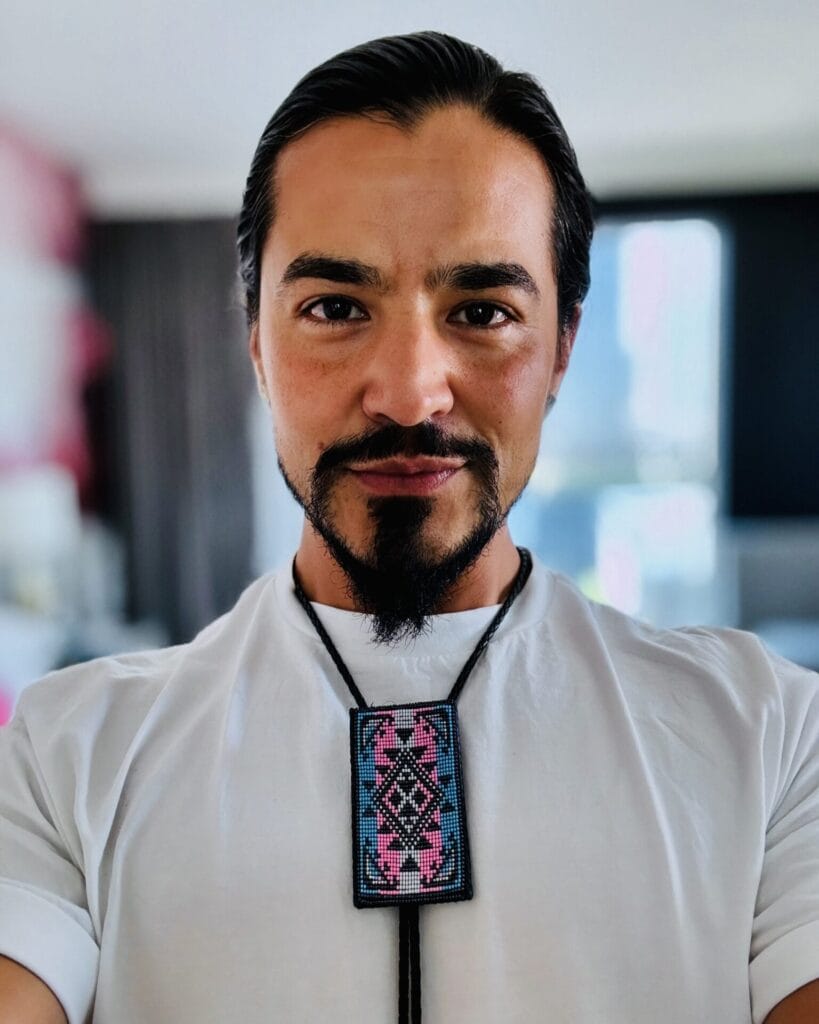
And when speaking about what his message would be for trans youth and those who may be older but just starting their journey, Ty reminded us, “While short-term struggles are real, having a vision for the future can help sustain motivation. This includes imagining a world where trans people are fully accepted, have equal rights, and live without fear. Encouraging others to visualize this future can build a collective sense of purpose.” He went on, talking about taking small steps but having big dreams, saying “It’s important to acknowledge that the journey to change is ongoing. Small actions, like advocating for inclusive policies at the local level, organizing support groups, or simply being kind to one another, can add up to create lasting change.”
Rodrigo echoed this message, encouraging people, “Get involved. Don’t get caught in the cycle of either doomscrolling the news or tuning out. Both paths are passive, and both leave you disempowered. Put yourself in the driver’s seat. Call your elected officials, vote in the local races everyone else ignores, run for local office yourself. Start a trans book club, mentor a trans youth, volunteer at your LGBTQ community center… History is made by those of us who take the initiative to make it happen. You can start right now.”
Emmett added a reminder that while the moment may seem scary, “Please remember there are thousands of people in Texas fighting for your futures, and your present. Our community has fought for decades for our right to survive and thrive, and we will continue to get through this and persevere. Our existence has always been challenged, but the transcestors whose shoulders we stand upon ensured that we made the progress we have – with far less resources.”
And Rodrigo offered a reminder that it’s okay to take a pause, saying, “You have more time than you think. When you’re young, everything feels like a big deal. As you age, you gain perspective. The same is true for your ‘trans age’, or how long since you started living as your authentic self. It can feel like you need to rush. But I encourage everyone to take a deep breath. I took a long time by many standards, yet I’m thriving. There’s no such thing as being behind. No one is in charge of your transition but you.”
And Sandy drew a throughline from past to present, reminding us of the progress that we have already made, saying “My generation lived through a period in which trans people made huge gains in public acceptance. We may not live to see gains like that again, but the current crop of trans kids almost certainly will. We’ve taken ten steps forward. Now we’re about to be beaten five steps back. But at the end of the day we’re still five steps ahead. That’s how culture works. That’s how progress works… bit by bit, it adds up. Twenty years ago there were a few lone trans voices. Now there are trans attorneys, trans legislators, trans academics, trans families, trans folks just living their lives. We’re not going back from that.”
She went on to offer her message as a trans elder, saying, “We’re here. We made it. Here’s a phone call from the future: we say you’ll survive and thrive and grow to become us, then you’ll surpass us, then you’ll reach back in time and extend a hand to the young ones. Across time, trans folk are shouting encouragement. You’ll make it. And you’ll accomplish things we never even dreamed of.”
Sandra harkened back to inner strength, reminding us of the miracle of being here in this moment, saying, “I think you learn, you grow, into the strengths of a trans woman. Trans women have got to be strong, man. If you have survived this long, your behind was strong. I knew plenty of plenty, plenty of women back in the day who didn’t make it. If I have a message to the youngins, it’s: ‘Youngins – stand still.’ Pay attention. Make sure the decisions you’re making will be your answers in the future. Make sure what you’re thinking or what you’re deciding right now, they’re going to add to your future. Fun is fun. Party is party. I know, and you all gotta have your fun and party, but please be aware, be aware of the journey of getting to your future.”
And Bamby reminded us that this is a generational fight, saying, “I think one of the things that it’s important for all of us to recognize is that we have a society and many institutions within our society that have for centuries tried to erase our existence and really negate opportunities for the integration of our community into the tapestry of our society, right? And so this is nothing new for many of us.”
“I would say it’s important for you to understand that we stand on the shoulders of generations of true fighters… and that it is important to understand that you, as an individual, hold power… And also as a community we have power… Understand that there’s a whole community that is fighting for you.”
And much like we started, Ty left us with a beautiful poem dedicated to trans youth:
You are unfolding,
like a flower that hasn’t yet decided
which direction the sun will call it.
Don’t be afraid to explore,
to stretch your wings in a thousand directions,
even those the world hasn’t named yet.
There are paths you haven’t seen,
roads that haven’t been built,
but they will be,
Listen closely to yourself,
the quiet voice that whispers
through the noise of others’ expectations,
the one that knows what you need,
even when the world is unsure.
Reach out to those who know
the weight of questions and the beauty of becoming.
Let their stories mingle with yours,
creating a tapestry of connection.
And remember,
there is no rush to arrive,
no deadline for who you are meant to be.
You are already enough,
just as you are,
and always, always,
you are becoming.
– Ty Defoe
Allucquére Rosanne “Sandy” Stone is Professor Emerita and Founding Director of the Advanced Communication Technologies Laboratory (ACTLab) and the Convergent Media program at the University of Texas at Austin, Wolfgang Kohler Professor of Media and Performance at the European Graduate School, Fellow of the University of California Humanities Research Institute, and Banff Centre Senior Artist. She was a 2023 Inductee into the National Women’s Hall of Fame.
Stone has conducted research on the neurological basis of vision and hearing for the National Institutes of Health, was a member of the Bell Telephone Laboratories Special Systems Exploratory Development Group, and has been a Silicon Valley consultant, computer programmer, and engineering manager. As a recording engineer, she worked with artists such as Jimi Hendrix and Grateful Dead and has produced and/or engineered over 100 rock, folk, blues, and classical albums. She was the feminist label Olivia Records’ recording engineer from 1974 to 1978.
A founding pioneer in both trans studies and digital media art and theory, Stone’s work has been exhibited and performed in galleries, museums, and conferences worldwide. She has appeared in the films The Lady and the Dale, Gendernauts, Genderation, and Traceroute, and published books, essays, and articles including The War of Desire and Technology at the Close of the Mechanical Age and The Empire Strikes Back: A Posttranssexual Manifesto, which has been translated into over 28 languages. Stone is the star of Girl Island: The Sandy Stone Story, an in production feature-length documentary film about her life directed by Marjorie Vecchio, which includes the re-release of her 1987 Manifesto as a graphic novel and audiobook with new sections and contributors. Upon the film’s completion, Stone’s archive will go to Harvard University’s Radcliffe Schlesinger Library for the History of Women in America.
Emmett Schelling (he/him/el) is a trans man, Houstonian, an immigrant from South Korea, an adoptee, and currently serves as executive director of TENT (Trans Education Network of Texas).
Emmett’s ferocious, community-focused, and no-nonsense approach to the work has led him to be given the honor of receiving an array of awards from local, state, and national organizations in recognition of his work. In 2022, he was named one of “TIME’s 100 2022 list of Most Influential People in the World.” His awards also include Equality Texas’s 2019 annual “Monica Roberts Trans Advocacy” award, 2020’s “Trans Advocate of the Year” from TLDEF, Texas Diversity Council’s annual “Trans Advocate of the Year” (2022), Equality Federation’s Leadership award (2022), and was most recently recognized as The Mahogany Project’s “Man of the Year”.
He happily resides in Houston with his wife, child, and two adopted pups. In his off time, he enjoys spending time with his family and friends through cuisine and sports.
Bamby Salcedo is a prominent and celebrated transgender Latina activist known all over the world for her passionate and productive social, political, and economic influence. As the President and CEO of The TransLatin@ Coalition (@translatinacoalition), Bamby steadily leads this nationally recognized organization that advocates for and addresses the issues of transgender Latinas throughout the United States. Bamby received her Master’s Degree in Mexican and Latin@ Studies from California State University, Los Angeles, and also developed the Center for Violence Prevention & Transgender Wellness, a multimillion, multipurpose, multiservice space for Trans people in Los Angeles.
Bamby’s wide-ranging activist work has brought visibility and given a voice to not only the trans community, but to countless others whose efforts focus on critical topics that include immigration, HIV, at-risk youth, LGBTQIA+ issues, incarceration, and more. Through her dynamic leadership, Bamby has developed several organizations that have created networks and connections where there were none, and she, to this day, tirelessly advocates for the rights, dignity, and humanity of those who are often silenced. Determined to affect change at every level, Bamby actively engages and supports many local, national, and international organizations and planning groups.
Rodrigo Heng-Lehtinen is the Executive Director of Advocates for Trans Equality (A4TE) and is a policy, advocacy, and messaging expert. Rodrigo is a proud Cuban American transgender man, with a career spanning over 16 years in policy and wide-ranging experience in the LGBTQI movement that has covered field organizing, volunteer training, leadership development, fundraising, and media advocacy.
Sandra Caldwell is a Washington D.C native. Her career extends throughout the whole of the arts community, with success in Theater, Film, Television, and Music, with renowned theater companies and orchestras around the world. Now with her series of one-woman show’s The Guide to Being Fabulous, In My Own Lane, and, Acoustically Yours, all leading to what she calls her ultimate truth in story, Hiding In Plain Sight, she once again reinvents herself.
In Toronto, Sandra was nominated for Canada’s highest theater honor, a Dora Mavor Moore Award, for her lead role as Phyllis, in Duke Ellington’s Sophisticated Ladies. Sandra made her Broadway debut in the original company of Buddy: The Buddy Holly Story, at New York’s Schubert Theater. She was absolutely delighted to be included in an Irving Berlin family sanctioned version of Annie Get Your Gun as Dolly Tate, directed by Canadian choreographer-director Donna Feore, Coming Through Slaughter, directed by Richard Rose, and Anything That Moves written by Ann-Marie-McDonald. But the defining moment, thus far must include Sandra’s portrayal of Darlene Andrews, outspoken trans advocate and etiquette teacher from the south side of Chicago in the groundbreaking production of Charm for New York’s MCC theater company. It changed the whole direction of her career. Other theater credits include Beehive, Leader Of The Pack, Comedy Of Errors with the Play on Shakespeare Festival, New York, and The Rocky Horror Picture Show, as the irrepressible Magenta.
Sandra’s Film highlights include, Book of Negroes, written by award winning Canadian author Lawrence Hill. The Cheetah Girls, Love Songs, Murder at 1600, Serendipity, Shall We Dance, Gracie’s Choice, Law & order SVU, Good Fences, Soul Food, Angels in Harlem, to name a few. It was with great pleasure that she appeared in Down In The Delta, Maya Angelou’s first directorial feature.
“Sandra Caldwell, a truly brave gifted artist.” – New York Times
Ty Defoe ([giizhig] he/we) is a citizen of the Oneida Nation and Anishinaabe Tribe, and Indigiqueer/two-spirit Nation. Ty is a Grammy Award winner, writer, interdisciplinary artist, and a sovereign story trickster, and has earned fellowships from Robert Rauschenberg, MacDowell, and Sundance, as well as Pop Culture Collaborative Trans Futurist and awards for the Jonathan Larson, Grammy, and Helen Merrill Playwrighting. Ty creates work with rural communities, Broadway productions, and in the metaverse, fostering relations for indigenous and decolonial futures. A professor of practice at ASU and a Writer in Residence at PACE. Ty considers himself a shape-shifter, bending in and out of artistic forms to vanguard against a Westernized binary system and celebrating the celestial force of rainbows. Ty loves the color clear and mood rings.












